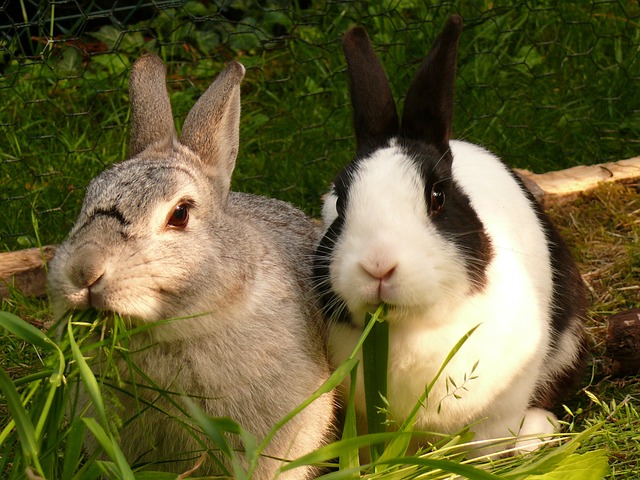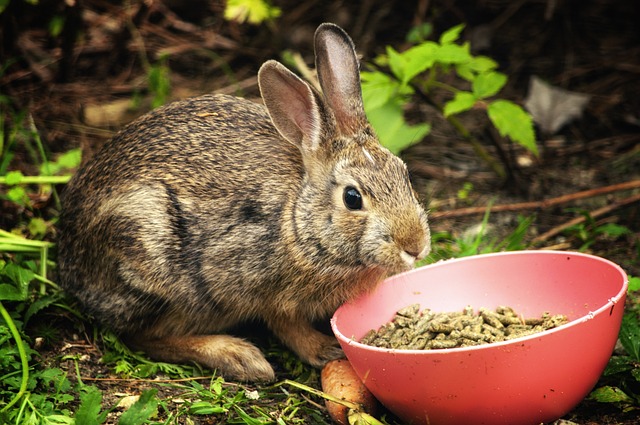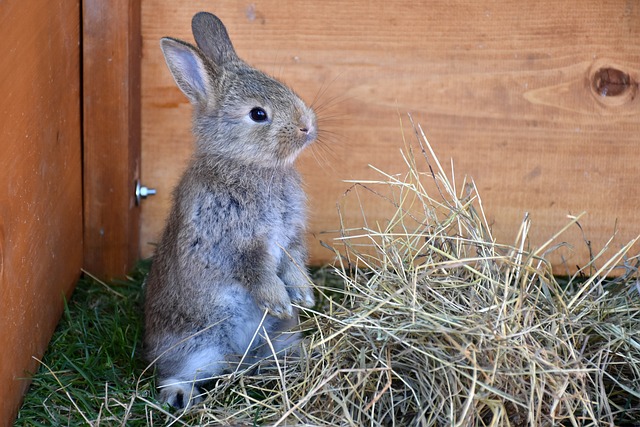In this article we try and answer some of the most popular questions that a pet rabbit owner may have regarding their pet rabbits dietary needs
Lets go
What foods can a pet rabbit eat?
Rabbits are herbivores, so their diet should consist mainly of hay, fresh vegetables, and a small amount of fruit.

Here are some examples of foods that pet rabbits can eat:
- Hay: Rabbits need a constant supply of hay, which should make up the majority of their diet. Good options include timothy hay, orchard grass hay, and oat hay.
- Fresh vegetables: A variety of fresh vegetables should be offered daily, including leafy greens like kale, spinach, and romaine lettuce, as well as other veggies like carrots, bell peppers, and broccoli. However, be careful not to overfeed rabbits with high calcium vegetables like spinach.
- Fruits: Fruits should be given sparingly as treats, due to their high sugar content. Good options include apple, banana, and blueberries. Remove any pits or seeds as these can be toxic.
- Pellets: Rabbit pellets are a good source of nutrition but should be given in moderation as they can cause obesity if overfed.
- Water: Provide fresh water to your rabbit daily in a clean water bottle or bowl.
What should pet rabbits not eat?
Rabbits have a sensitive digestive system and there are certain foods that they should not eat, including:
- Chocolate: Chocolate is toxic to rabbits and can cause diarrhea, vomiting, seizures, and even death.
- Avocado: Avocado contains persin, which can be toxic to rabbits and cause digestive problems.
- Potatoes: Raw potatoes and potato skins contain solanine, which can be poisonous to rabbits.
- Iceberg lettuce: Iceberg lettuce has a high water content but lacks nutritional value and can cause diarrhea in rabbits.
- Nuts and seeds: Nuts and seeds are high in fat and can cause digestive problems in rabbits if overfed.
- Rhubarb: Rhubarb contains oxalates, which can be harmful to rabbits and cause kidney damage.
- Dairy products: Rabbits are lactose intolerant and cannot digest dairy products, which can cause diarrhea and other digestive problems.
- Bread, pasta, and grains: These foods are high in carbohydrates and can cause digestive problems and obesity in rabbits if overfed.
It's important to note that these are just a few examples and there are many other foods that rabbits should avoid. Always do your research and consult with a veterinarian to ensure that your pet rabbit is getting a balanced and safe diet.
What fruit and vegetables can pet rabbits eat?
Rabbits can eat a wide variety of fruits and vegetables as part of a balanced diet. Here are some examples of fruits and vegetables that rabbits can eat:
- Leafy greens: Rabbits love leafy greens, which are a great source of vitamins and minerals. Good options include kale, spinach, arugula, romaine lettuce, and bok choy.
- Carrots: Carrots are a popular treat for rabbits, but should be given in moderation due to their high sugar content.
- Bell peppers: Bell peppers are a great source of vitamin C and are a tasty snack for rabbits.
- Broccoli: Broccoli is a good source of fiber and vitamins, but should be given in moderation as it can cause gas if overfed.
- Strawberries: Strawberries are a sweet treat that rabbits can enjoy in small amounts.
- Blueberries: Blueberries are another fruit that rabbits can enjoy as a treat.
- Apples: Apples are a good source of fiber and vitamin C, but should be given in small amounts due to their high sugar content.
Remember to always introduce new fruits and vegetables gradually to your rabbit's diet, to avoid digestive upset. Also, make sure to thoroughly wash all fruits and vegetables before feeding them to your rabbit.
What veggies can rabbits eat daily?
Rabbits should have a varied diet that includes a mix of hay, fresh vegetables, and a small amount of pellets.
Here are some vegetables that rabbits can eat daily:
- Leafy greens: Rabbits can eat a variety of leafy greens, such as romaine lettuce, arugula, kale, and spinach. These provide important vitamins and minerals and can be offered daily in small amounts.
- Carrots: Carrots are a good source of vitamin A and can be offered to rabbits daily in small amounts.
- Bell peppers: Bell peppers are a good source of vitamin C and can be offered to rabbits daily in small amounts.
- Broccoli: Broccoli is a good source of fiber and can be offered to rabbits daily in small amounts.
- Cucumber: Cucumber is a good source of hydration and can be offered to rabbits daily in small amounts.
It's important to introduce new foods slowly and in small amounts to prevent digestive upset. Offer fresh vegetables in moderation to avoid overfeeding, which can lead to health problems like obesity. Always consult with a veterinarian for specific dietary recommendations for your rabbit.
Are rabbit pellets high in protein?
Rabbit pellets are usually formulated to provide a balanced diet for rabbits and are typically made up of hay, grains, and other essential nutrients.

The protein content of rabbit pellets can vary depending on the brand and type of pellets, but generally, they contain around 14-16% protein.
While protein is important for rabbits, it's important not to overfeed them with high-protein foods, as this can lead to health problems such as obesity and kidney disease. Feeding your rabbit too many pellets can also cause them to eat less hay, which is essential for their digestive health.
It's important to provide your rabbit with a varied diet that includes hay, fresh vegetables, and a small amount of fruit, in addition to pellets. This will ensure that your rabbit is getting all the essential nutrients they need, while avoiding overfeeding with high-protein foods.
What happens if a rabbit has too much protein?
If a rabbit has too much protein in their diet, it can lead to a variety of health problems. Rabbits have a unique digestive system that requires a high-fiber, low-protein diet to function properly. Here are some potential health issues that can arise if a rabbit has too much protein in their diet:
- Kidney disease: Rabbits can develop kidney disease if they consume too much protein. High protein intake can lead to an accumulation of urea in the bloodstream, which can put stress on the kidneys.
- Liver disease: A high-protein diet can also lead to liver disease in rabbits. The liver processes protein, and if the intake is too high, it can cause damage to the liver cells.
- Obesity: Overfeeding with high-protein foods like pellets can cause rabbits to become overweight or obese, which can lead to a range of health problems.
- Digestive problems: Rabbits require a high-fiber diet to maintain good digestive health. A diet that's too high in protein can lead to digestive problems like diarrhea, bloating, and gas.
It's important to provide your rabbit with a balanced diet that's appropriate for their unique nutritional needs.
What should I feed a nursing rabbit?
A nursing rabbit requires a diet that is high in nutrients and energy to support milk production and ensure the health of both the mother and the kits. Here are some recommendations for what to feed a nursing rabbit:
- Hay: Fresh, high-quality hay should make up the majority of a nursing rabbit's diet. Timothy hay, orchard grass hay, and oat hay are all good options. Hay provides essential fiber and nutrients and helps to maintain good digestive health.
- Pellets: Nursing rabbits may require a higher calorie diet to support milk production, so you may need to increase the amount of pellets you feed them. Choose a high-quality, fresh pellet that is specifically formulated for nursing rabbits.
- Fresh vegetables: Offer a variety of fresh vegetables to your nursing rabbit, such as leafy greens, carrots, broccoli, and bell peppers. These provide important vitamins and minerals and can help to provide some variety in the rabbit's diet.
- Fresh water: Make sure your nursing rabbit has access to fresh, clean water at all times.
It's important to monitor your nursing rabbit's weight and adjust their diet accordingly. Offer food in small, frequent meals throughout the day to ensure they're getting enough nutrients and energy to support milk production.
How often should a rabbit eat?
Rabbits are grazing animals and in the wild, they eat small amounts of food throughout the day. Therefore, it's best to offer your pet rabbit small, frequent meals throughout the day, rather than one or two large meals.

Here are some guidelines for feeding frequency:
- Hay: Fresh hay should be available to your rabbit at all times. This is an important source of fiber and helps to maintain good digestive health.
- Pellets: Depending on the age and weight of your rabbit, offer them a small amount of pellets 1-2 times per day. Follow the guidelines on the package to determine the appropriate amount to feed your rabbit.
- Fresh vegetables: Offer fresh vegetables to your rabbit once or twice a day, in small amounts.
- Treats: Offer treats in moderation, and limit high-sugar foods like fruit.
It's important not to overfeed your rabbit, as this can lead to health problems like obesity and digestive issues. Consult with a veterinarian for specific dietary recommendations for your rabbit based on their age, weight, and overall health.



